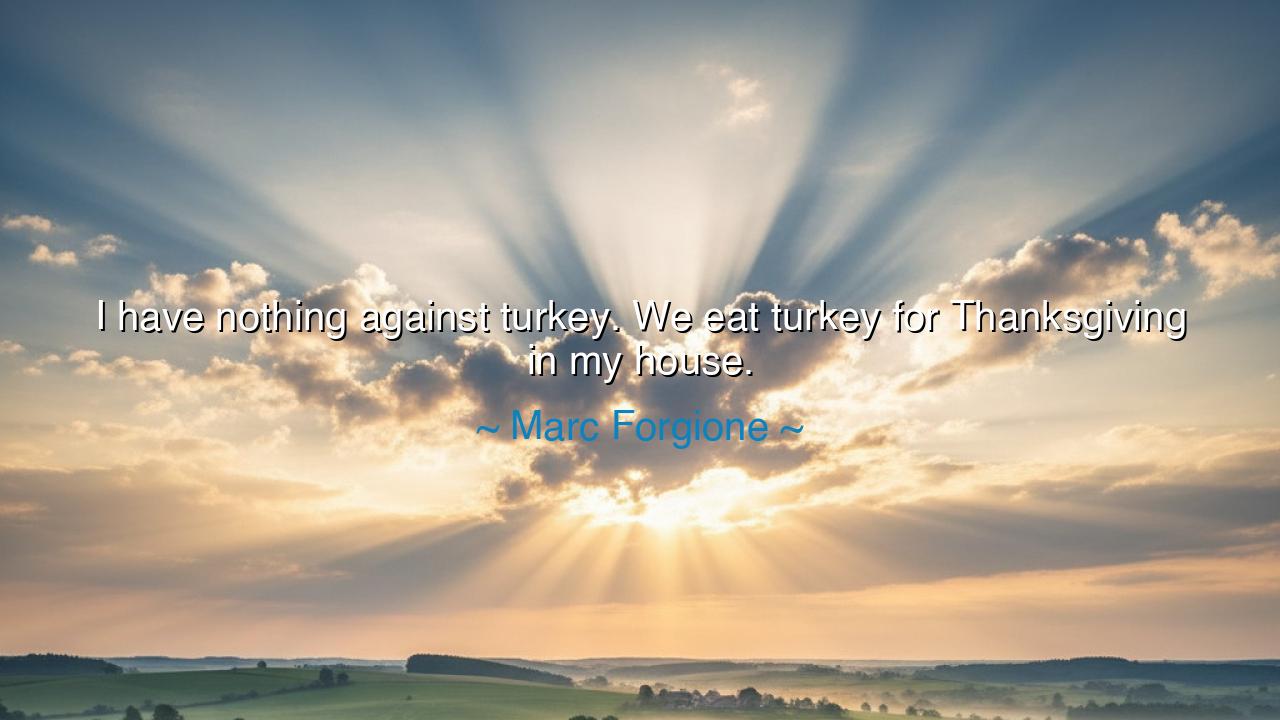
I have nothing against turkey. We eat turkey for Thanksgiving in






Marc Forgione once spoke with humility and balance when he said: “I have nothing against turkey. We eat turkey for Thanksgiving in my house.” These words, plain at first glance, conceal a greater wisdom about tradition, acceptance, and the quiet strength of continuity. For Forgione, a chef celebrated for creativity and innovation, does not dismiss the humble bird that anchors America’s most sacred feast. Instead, he honors it—acknowledging that even in a world of endless culinary invention, the familiar still holds meaning, and tradition remains a thread binding generations together.
The origin of this saying lies in Forgione’s role as both a culinary artist and a son of heritage. In a profession where chefs are often tempted to dazzle with novelty, there is pressure to replace the turkey with more exotic fare, to reinvent the Thanksgiving table with extravagance. Yet Forgione affirms his respect for the old ways: his family still gathers around the roasted bird, just as countless others do across the land. In this, he recognizes that food is not only about flavor, but about ritual, belonging, and memory.
Throughout history, we see the same tension between innovation and tradition. In the courts of medieval kings, chefs would design elaborate feasts with gilded dishes and fantastical creations. Yet at the heart of every banquet lay the simple roast meats and breads that people had eaten for centuries. In ancient Greece, philosophers debated the meaning of luxury, but they too gathered over the same olives, wine, and fish that sustained their forebears. Forgione’s words echo this truth: novelty may dazzle for a season, but it is the humble and familiar that endure.
The turkey itself has become a symbol far greater than food. At the first Thanksgiving, the meal was not yet codified—historians remind us that venison, fish, and fowl shared the table. But over time, the turkey became the centerpiece, chosen not for its grandeur alone, but for its abundance and its ability to feed many. It became a sign of family togetherness, of generosity, of the harvest’s bounty. Forgione’s affirmation of the bird is therefore not mere culinary preference, but a bow to centuries of meaning layered upon it.
Yet there is also humility in his words: “I have nothing against turkey.” He does not exalt it above all other foods, nor insist upon it as sacred law. He acknowledges it with respect, but without idolatry. This teaches us the virtue of moderation: to cherish tradition without being enslaved by it, to honor the familiar without scorning the new. Forgione recognizes that in his house, the meal is not only about food but about family, and it is in that fellowship that the true feast resides.
The lesson here is luminous: do not despise the simple traditions that bind you to your people. Whether it be turkey at Thanksgiving, bread at the table, or stories retold through generations, honor these rituals, for they are vessels of memory. At the same time, do not cling so rigidly that you cannot welcome change. Balance is the true feast—respect for the past, openness to the present, and gratitude in all things.
So, O listener, let Marc Forgione’s words remind you: when you gather at your house for Thanksgiving, the meal is not a test of extravagance, but a celebration of presence. Whether you serve turkey or some other dish, do it with gratitude, with love, and with reverence for those who share it with you. For the greatness of the feast lies not in the perfection of the food, but in the bonds of tradition and affection that endure long after the plates are cleared. This is the true harvest, the true banquet, the true blessing.






AAdministratorAdministrator
Welcome, honored guests. Please leave a comment, we will respond soon